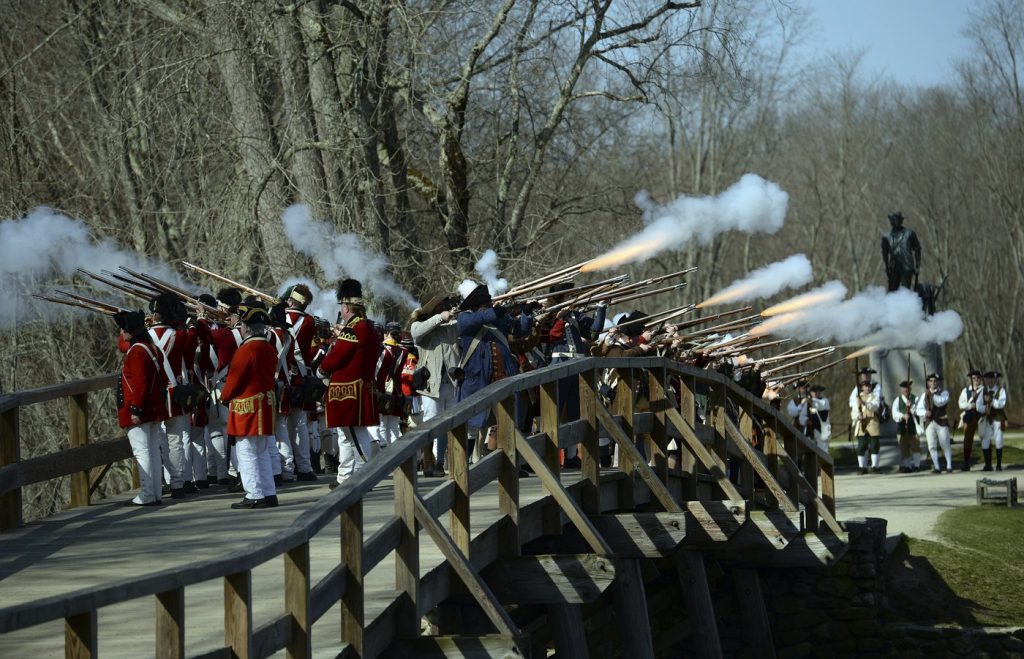NEW YORK (AP) – The 250th anniversary of the American Revolution is upon us, marked by the anniversary of the Battles of Lexington and Concord on April 19, 2025. This pivotal moment in American history will prompt the nation to reflect on the legacies of the Revolution and its implications for contemporary society.
The anniversary arrives at a time of debate among political leaders, such as former President Donald Trump, scholars, and the public about how best to commemorate this milestone. Trump has suggested a grand yearlong celebration leading up to July 4, 2026. In contrast, some advocates recommend a more balanced approach that incorporates discussions about women's contributions, the experiences of enslaved individuals, and the histories of Indigenous peoples.
The events of Lexington and Concord, located in Massachusetts, are steeped in both historical significance and myth. On the early morning of April 19, 1775, hundreds of British troops marched from Boston toward Lexington, around 14 miles (22.5 kilometers) away. Eyewitness accounts recount British officers demanding the colonists to surrender their arms, followed by gunfire that initiated the conflict. The chaos escalated, resulting in approximately 250 British and 95 colonial casualties by the end of the day as the fighting continued to Concord, about 7 miles (11 kilometers) further west.
The identity of the first shooter remains a mystery, with historians indicating that the American revolutionaries initially sought to improve their contentious relationship with King George III rather than completely break away from British rule. Woody Holton, an early American history professor at the University of South Carolina, highlights that the April 1775 rebels primarily desired to revert to conditions prior to disputes such as the Stamp Act and the Tea Act.
According to Pulitzer Prize-winning historian Stacy Schiff, the battles galvanized public opinion as intended by the Massachusetts revolutionaries, despite the long path ahead to a formal declaration of independence. She notes that, at the time, many could not fathom that a mother country and its colony could engage in armed conflict.
The narrative of Lexington and Concord also reflects the appointed leaders' foresight in framing their cause as more significant than a mere disagreement between subjects and rulers. The Suffolk Resolves of 1774 articulated a vision of liberty "unfettered by power," framing the conflict as one that could affect the "fate of this new world" and future generations.
As military historian Rick Atkinson notes, Lexington and Concord represented a surprising victory for the colonial militia, challenging British underestimations of their resolve. The aftermath saw revolutionary leaders like Samuel Adams mobilizing narratives to portray the British as aggressors, insisting that the colonies needed to present a united front on who initiated the violence. Adams worked diligently to ensure the skirmish would be remembered as a key moment in American history.
Neither side anticipated that the conflict would last eight long years. The founding figures were united in their pursuit of self-governance, yet they held divergent views on the methods and principles that would guide this nascent nation. The ongoing debates regarding power balances, enfranchisement, and the interpretation of "all men are created equal" have been pivotal throughout American history.
Atkinson reminds us that the founding language was aspirational, especially in a context where slavery was widespread. He emphasizes that the framers of the nation likely did not envision a future with 330 million citizens and observes that America's journey remains an unfinished narrative, suggesting that the quest for democracy is ever-evolving.










